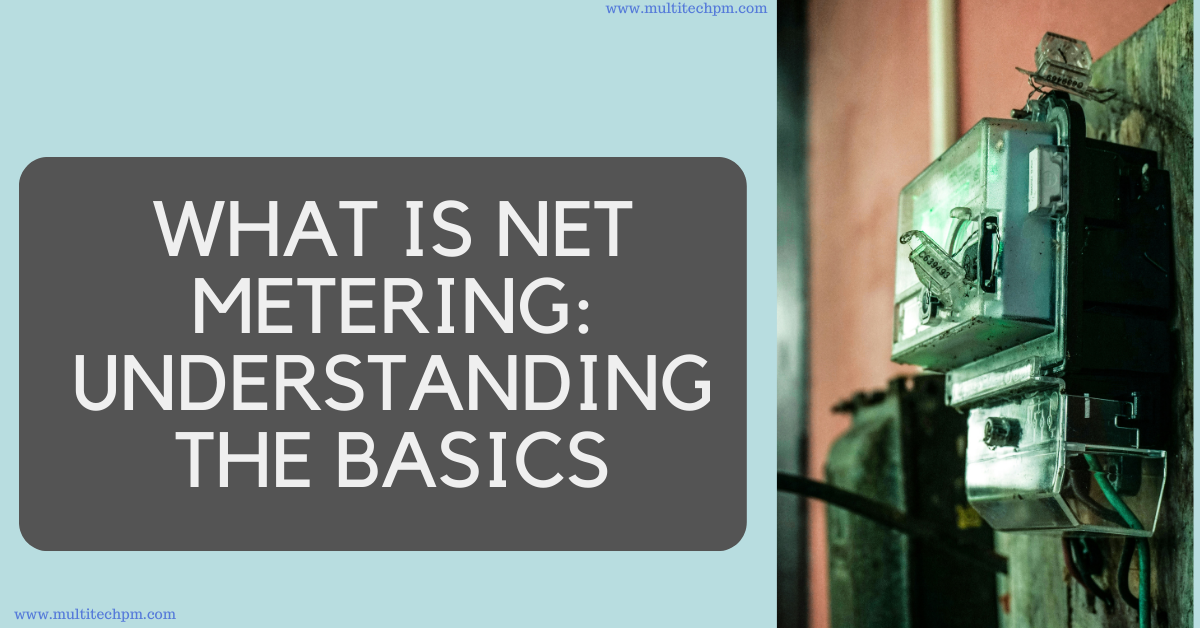This article aims to discuss what is net metering, understanding the basics, covering its definition, functioning, fundamental aspects, and key considerations. We’ll also evaluate its overall value and explore strategies for recouping the initial investments. Continue reading to gain a comprehensive insight into what is net metering!
TABLE OF CONTENTS
- What is Net Metering
- How Does it Work?
- PROS and Advantages of Having Net Metering
- CONS – Considerations before utilizing Net Metering
- The Bidirectional Meter
- Conclusion : Final Solar Thought
What is Net Metering?
Picture this: your solar PV system is up and running smoothly. Then, you realize that your daily energy consumption is significantly lower than your initial expectations. How do you confirm this? You can check the battery charges or, calculate the anticipated loads against the actual ones, factoring in duration and usage patterns. Once you identify the surplus, the question arises: why let that extra energy go to waste? Excess energy not consumed is still wasted energy right? This is where net metering steps in – not just a way to avoid energy wastage, but an opportunity to sell and monetize the excess energy you’ve generated.
In definition, net metering is a billing arrangement enabling solar panel owners to contribute or sell excess electricity back to the grid. Imagine it as a two-way energy street – energy flows from the grid to your house, and when there’s surplus, you can channel your excess energy back to the grid.
Follow this link to learn more about the advantages of solar PV system.
How Does it Work?
We’ve already established that solar panels convert the sun’s energy into electricity for our homes. And there’s also the generated extra energy but not in anyway will be used. Any excess energy is then sent back to the grid, it seems to be like pouring a small bucket of water into the vast sea. Even though it may seem small, it contributes to the overall electricity available in the grid. And to measure the in and out usage, we use a bidirectional meter. Refer to the figure below.

A bidirectional meter effectively measures electricity flow in two directions, keeping tabs on both your consumption and the energy you contribute. The recorded data is then transmitted to the utility company, and you receive compensation in the form of credits or cash. Typically, these credits are applied towards offsetting your future electricity bills. You need to still confirm this with the utility company.

PROS and Advantages of Having Net Metering
Primarily, the most apparent benefit lies in the reduction of energy bills. Net metering offers a substantial advantage by allowing you to accumulate credits through sending excess energy to the grid. These credits become invaluable during periods when your solar panels might not generate sufficient electricity, such as during off-season weather, fall, winter, or rainy days, depending on your location.
Second, is the Net metering can serve as another Revenue Stream. In certain instances, subject to local regulations, you may even be eligible for compensation for the surplus energy you contribute. It is crucial to confirm this with your utility provider before making any plans. Additionally, during the initial setup, they might offer government loans, incentives, and other benefits. So make sure to coordinate and plan ahead.
And lastly, another benefit is the ability to contribute to grid stability. Sending excess energy back to the grid aids in supplying electricity to other customers, particularly in remote areas. It’s worth noting that the rates for the energy sold to the utility company will generally be lower than their standard rates. However, in certain setups, you may also have the option to purchase electricity from the utility company for your home at a discounted rate, depending on your utility provider.
CONS – Considerations before utilizing Net Metering
Initially, individuals seeking Net Metering must navigate through numerous permits and inspections, as utility companies prioritize safe and proper installations. This process may necessitate the involvement of professional engineers and technicians for the design and installation phases. Consequently, the initial setup can be relatively expensive, although some utility companies may offer the meter itself once the approval is granted
Maintenance and metering can be bothersome, requiring periodic inspections by the utility company. Regular monitoring of energy production and consumption is essential. Fortunately, modern designs incorporate remote monitoring and tools that enable real-time tracking of both usage and consumption.
The Bidirectional Meter
The essence of net metering revolves around the bidirectional meter. As explained earlier, unlike traditional meters that solely measure consumption, these meters accurately track both outgoing and incoming electricity. Typically, utility companies provide and install these meters. However, there are instances where the owner may provide them, leading to subsequent credits being issued back to the owner or sometimes directly to the customer. Many modern bidirectional meters are now equipped with smart systems, enabling them to remotely transmit readings to both the company and the customer.
Learn more about the other components for a working solar PV system.
Conclusion : Final Solar Thought
The benefits of Net meting extend beyond mere financial gains. You’re not just saving money, but you’re also contributing to grid stability, especially in areas beyond the immediate reach of utility companies. It’s like sharing your energy abundance with those who need it.
As the impact goes beyond dollars and cents; it’s also a nod to humanity. By embracing net metering, you’re not just making a wise financial choice; you’re making a compassionate one too. You become a champion for renewable energies, leading by example and actively participating in the revolution toward a cleaner and greener world and to a more sustainable future.
Click to learn more about all the different types of solar power systems.

